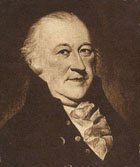Colonial Wars |
American Wars |
Link To This Page — Contact Us —
Major General Artemas Ward
 |
| NAME |
| Ward, Artemas |
| BORN |
| November 26, 1727 Shrewsbury, Massachusetts |
| DIED |
| October 28, 1800 Shrewsbury, Massachusetts |
| ARMY |
| American |
Ward was born in 1727 to Nahun and Martha Ward. He was the sixth of 7 children. His father had broad and successful career interests as a sea captain, merchant, land developer, farmer, lawyer and jurist. As a child he attended the common schools and shared a tutor with his brothers and sisters. He graduated from Harvard University in 1748 and taught there briefly.
On July 31, 1750, he married Sarah Trowbridge , the daughter of the Reverend Caleb Trowbridge and Hannah Trowbridge of Groton, Massachusetts. The young couple returned to Shrewsbury where he opened a general store. In the next 15 years, they would have 7 children: Ithamar, Nahum, Sara, Thomas, Artemas Jr., Henry Dana, Martha, and Maria.
Ward graduated from Harvard Univesity in 1748. He entered public life at an early age as a representative to the general assembly, and was afterward chosen to the executive council. In 1752, he was a justice of the peace in his native town. In 1755, he served as major in Col. Abraham Williams's regiment, and in 1758, he was major in the one that was commanded by William Williams. He accompanied the expedition under Gen. James Abercrombie against the French and Indians, attaining the rank of lieutenant-colonel, and succeeded to the command of the 3rd Regiment.
On October 27, 1774, Ward was appointed a brigadier-general by the Provincial Congress of Massachusetts, to which he was a delegate. On May 19, 1775, he was made Commander-in-Chief of the Massachusetts forces.
Following the Battle of Lexington on April 19, 1775, the Americans followed the British back to Boston and started the siege of the city. At first, Ward directed his forces from his sickbed, but later moved his headquarters to Cambridge. Soon, the New Hampshire and Connecticut provisional governments both named him head of their forces participating in the siege. Most of his efforts during this time were devoted to organization and supply problems.
Additional British forces arrived in May and in June, Ward learned of their plan to attack Bunker Hill. He gave orders to fortify the point, setting the stage for the Battle of Bunker Hill on June 17, 1775. Command during the battle devolved upon Maj. Gen. Israel Putnam and Col. William Prescott. While Ward received national recognition for the heroic stand made that day, his principal contribution was a failure to supply enough ammunition to hold the position.
Meanwhile, the Continental Congress was creating a Continental Army. On June 16, they named Ward a major general, and second in command to Gen. George Washington. Over the next 9 months, he helped convert the assembled militia units into the Continental Army.
After the British evacuation on March 17, 1776, Washington led the main army to New York City. Ward took command of the Eastern Department on April 4, 1776. He held that post until March 20, 1777, when his health forced his resignation from the Army.
In 1779, Ward was appointed a delegate to the Continental Congress, but, owing to failing health, did not take his seat but afterwards, was elected to the United States House of Representatives as a Federalist, he served from October 4, 1791-March 3, 1795. Even during his military service, he served as chief justice of the Court of Common Pleas of Worcester County in 1776 and 1777.
Ward was President of the Massachusetts Executive Council from 1777-79, which effectively made him the governor before the 1780 ratification of the Massachusetts Constitution. He was continuously elected to the Massachusetts House of Representatives for each year from 1779-85 and also served as a delegate to the Continental Congress in 1780 and 1781. Ward was a member of the legislature for 16 years, serving as the Speaker of the Massachusetts House in 1785. He possessed integrity and unyielding principles, and his judicial conduct, especially during Shays's Rebellion in 1786, was highly commended.
President John Adams described him as "...universally esteemed, beloved and confided in by his army and his country." Ward was much more effective as a political leader than as a soldier. He is buried with Sarah in Mountain View Cemetery.
